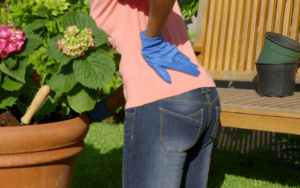Spinal Health Tips for Gardening

It can be a strenuous task looking after the garden so we have compiled a list of tips to help you this summer. When back pains happen during or after gardening it is usually because of pre-existing problems of asymmetric spinal biomechanics which can be caused by a number of factors such as poor posture, degenerative disc disease and poor muscle conditioning, to name a few.
Here are some suggestions to help your spine when engaging in the beautiful pastime of gardening:
- Get your spine checked regularly by a Chiropractor so that you can keep enjoying doing the things you enjoy, such as gardening. A maintenance Chiropractic adjustment will unlock any spinal blockages and reboot the nervous system so that the brain receives the correct communication with the joints of the spine. When this communication system via the nervous system becomes compromised, this is when a spine can become fragile and will most likely seize up!!
- Warm-up before you start any gardening activity so that the muscles are activated before engaging them. Gardening can be a real workout, so try a brisk five-minute walk and some stretching exercises before any gardening commences. One relatively gentle stretch is the back-flexion exercise, in which you lie down on your back, then pull both knees to your chest while bringing your head forward. Hold for 10 seconds and repeat this stretch three times.
- Plan what you want to achieve during a given gardening session and prepare for the predicted workload. Get the right tools from the shed for each activity. Mix up the various gardening jobs so that you do not spend too much time in one position.
- Get down and get dirty. A lot of people bend too much whilst gardening. The trick is to get on your knees so that the discs are not overworked, this will alleviate pressure from the discs. Get an old rolled towel and use this as the knee rest so your knees do not get too uncomfortable. Alternatively, invest in a garden kneeler with padding or a pair of cushioned knee pads.
- Use a Sacro-iliac Belt during heavy gardening and lifting. These belts are great and can give you that extra support. The principle behind the Sacro-Iliac belts is that they tighten the pelvic joints when you are active and because no muscles cross these joints it means that you are not weakening any spinal muscles whist wearing the belt, also the holding ligaments of the spine get that little bit more of support. This also allows the lower back muscles to keep working and get a workout. DO NOT use Lumbar supports as these immobilise the lumbar joints and will create muscle weakness in the low back within a few days of wearing. We can fit these belts for you and tell you how and when to wear them. They cost £45 and will last a good 5 years, if you look after them (see picture below).
- Lifting heavy pots, bushes, and full watering cans without proper back support can injure the discs, muscles, and/or ligaments in your back. To lift in an ergonomically supported manner, begin by squatting, and not bending at your waist. Use both hands to hold the object, keeping it close to your body, and slowly straighten your legs as you stand. To minimize lifting, use a wagon, dolly, or other lifting aids to carry heavy items from place to place. Fill large watering cans just halfway, and consider alternative watering options such as a hose.
- Try out specialized tools. Long-handled tools can eliminate much of the bending required by planting and weeding. For example, long-handled trowels and cultivators can be helpful if bending forward causes or worsens your back pain.
- Hydrate and take regular breaks. Take some water with you whilst gardening and sip regularly. You need at least 2L of water each day so take a break and hydrate.



